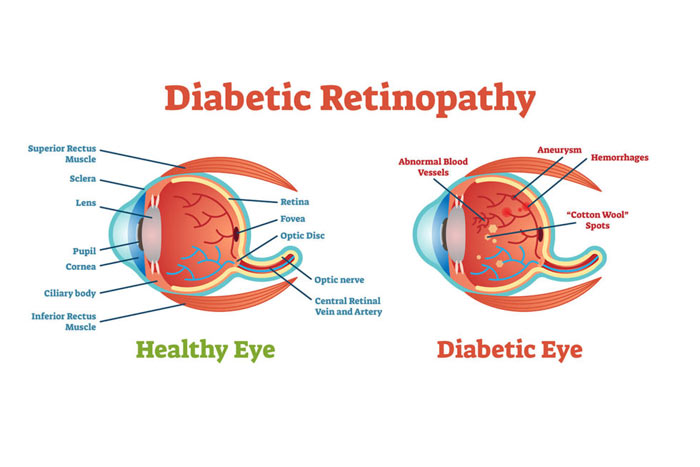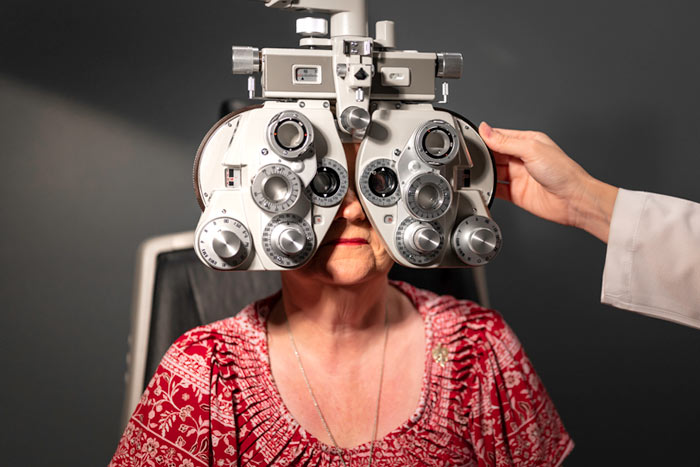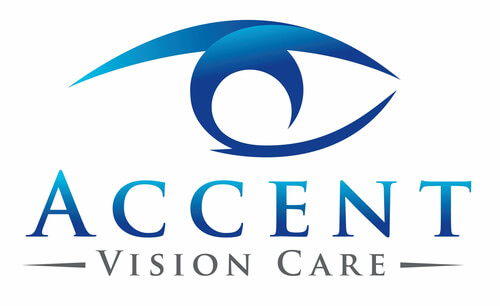Diabetic Eye Exam


Diabetic Eye Disease
People who have Type 1 or Type 2 diabetes can develop serious complications with their eye health and vision. Diabetes can affect the eyes when blood sugar is too high, particularly when this level is not controlled over time. When blood sugar is too high, it can damage the blood vessels in the back of the eyes which may leak fluid or cause swelling.
Diabetic eye disease refers to a group of diseases that can affect people with diabetes, including diabetic retinopathy, cataracts, diabetic macular edema, and glaucoma. Diabetic eye disease can damage the eyes and result in poor vision or blindness, and often there are no symptoms in the early stages. Anyone with diabetes can develop diabetic eye disease, but the risk increases if blood sugar levels and/or blood pressure levels aren’t controlled.
- Diabetic retinopathy is the most common cause of vision loss and blindness for diabetics. This disease affects the blood vessels in the retina, which is the light-sensitive layer in the back of the eye. In the early stages of the disease, there may not be any obvious symptoms. In the later stages, as the blood vessels start to bleed into the vitreous, which is a gel-like fluid that fills the eye, dark, floating spots or streaks may occur in vision. The risk of developing diabetic retinopathy increases the longer you have diabetes. Women with diabetes who get pregnant or develop diabetes while pregnant (gestational diabetes) are also at high risk of developing diabetic retinopathy, so if you are pregnant and have diabetes, you need a diabetic eye exam as soon as possible.
- Cataracts are a common occurrence as people get older, but they can happen to diabetics at an earlier age than people without diabetes. Cataracts cause the front part of the eye to become cloudy and can make vision blurry or hazy, cause colors to seem faded, reduce night vision and increase sensitivity to light, and over time, can lead to vision loss.
- Diabetic macular edema is characterized by a build-up of fluid and swelling in the macula, which is the part of the retina used to see clearly while driving, reading, and seeing faces. This disease can damage the vision in this part of the eye, and lead to either partial vision loss or blindness.
- Glaucoma is a group of eye diseases that damage the optic nerve. This disease is sometimes called “the silent thief of sight” because it can begin with little to no pain or symptoms, and the only way to catch it is through regular eye exams. Diabetics have an increased risk of developing glaucoma.
Diabetic Eye Exam
If you have Type 1 or Type 2 diabetes, then you need a diabetic eye exam at least once each year, and your doctor may recommend coming in for eye exams more often than that, based on your health history. The expert doctors at Accent Vision Care will perform special tests as part of your eye exam to screen for signs of diabetic eye disease.
To schedule a diabetic eye exam at our office in Gonzales, contact us today.
What is Myopia Control?
Various forms of myopia control help slow or stop the progression of myopia, preventing nearsightedness from getting worse. One form of myopia control treatment is available through MiSight® contacts, the first and only soft contact lenses that are FDA approved to slow the progression of myopia in children age 8-12 at the start of treatment. Approval from the Food and Drug Administration (FDA) means that the lenses have been tested over a long period and have met all the safety requirements established.
At Accent Vision Care, we are certified providers of MiSight®1 Day contact lenses. This form of myopia management is safe and proven to be effective. Kids ages 8-12 wearing MiSight® 1-day contact lenses experienced an average of 59 percent reduction of myopia progression when used over three years.²
Myopia Control in Gonzales
Interested in learning more about myopia management? Schedule an eye exam for your child at our Gonzales eye care center and let us know you want to learn more about myopia control and MiSight®1 Day for Myopia Control contact lenses. Our optometrists will examine your child’s eyes and present suitable next steps for their needs.
Sources:
- WHO – The Impact of Myopia and High Myopia
- Cooper Vision- Learn About Myopia

